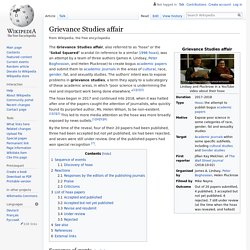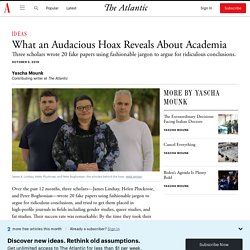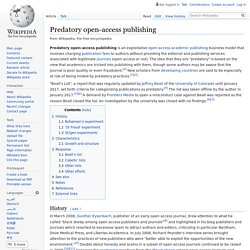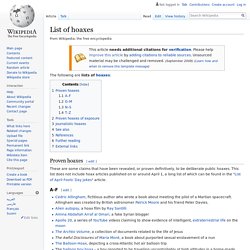

Grievance Studies affair - WIkipedia. 2018 group of bogus academic papers The Grievance Studies affair, also referred to as "hoax" or the "Sokal Squared" scandal (in reference to a similar 1996 hoax), was an attempt by a team of three authors (James A.

Lindsay, Peter Boghossian, and Helen Pluckrose) to create bogus academic papers and submit them to academic journals in the areas of cultural, race, gender, fat, and sexuality studies. The authors' intent was to expose problems in grievance studies, a term they apply to a subcategory of these academic areas, in which "poor science is undermining the real and important work being done elsewhere. "[1][2][3] The hoax began in 2017 and continued into 2018, when it was halted after one of the papers caught the attention of journalists, who quickly found its purported author, Ms.
By the time of the reveal, four of their 20 papers had been published, three had been accepted but not yet published, six had been rejected, and seven were still under review.
Dr. James Lindsay. Dr. Peter Boghossian. J.B.P: Interview with the grievance studies hoaxers. What the New Sokal Hoax Reveals About Academia - The Alantic. Further reading: It’s surprisingly easy to get a fake paper published in an academic journal Next, Sokal sent off this jabber to Social Text, an academic journal that was, at the time, a leading intellectual forum for famous scholars including Edward Said, Oskar Negt, Nancy Fraser, Étienne Balibar, and Jacques Rancière.* It was published.

In the eyes of his supporters, what came to be known as the Sokal Hoax seemed to prove the most damning charges that critics of postmodernism had long leveled against it. Postmodern discourse is so meaningless, they claimed, that not even “experts” can distinguish between people who make sincere claims and those who compose deliberate gibberish. In the months after Sokal went public, Social Text was much ridiculed.
But its influence—and that of the larger “deconstructivist” mode of inquiry it propagated—continued to grow. That’s why Lindsay, Pluckrose, and Boghossian set out to rerun the original hoax, only on a much larger scale. Hoaxers Slip Breastaurants and Dog-Park Sex Into Journals. Joe Rogan Experience #1222 - Michael Shermer. Category:Academic scandals. Predatory open-access publishing. Predatory open-access publishing is an exploitative open-access academic publishing business model that involves charging publication fees to authors without providing the editorial and publishing services associated with legitimate journals (open access or not).

The idea that they are "predatory" is based on the view that academics are tricked into publishing with them, though some authors may be aware that the journal is poor quality or even fraudulent. [a] New scholars from developing countries are said to be especially at risk of being misled by predatory practices.[2][3] "Beall's List", a report that was regularly updated by Jeffrey Beall of the University of Colorado until January 2017, set forth criteria for categorizing publications as predatory.[4] The list was taken offline by the author in January 2017.[5][b] A demand by Frontiers Media to open a misconduct case against Beall was reported as the reason Beall closed the list.
History[edit] Bohannon's experiment[edit] Notes[edit] List of religious hoaxes. List of hoaxes. The following are lists of hoaxes: Proven hoaxes[edit] These are some claims that have been revealed, or proven definitively, to be deliberate public hoaxes.

This list does not include hoax articles published on or around April 1, a long list of which can be found in the "List of April Fools' Day jokes" article. A–F[edit] G–M[edit] N–S[edit] T–Z[edit] Proven hoaxes of exposure[edit] "Proven hoaxes of exposure" are semi-comical or private sting operations. Journalistic hoaxes[edit] Deliberate hoaxes, or journalistic fraud, that drew widespread attention include: Critiques of Political Correctness. Rejection of SJW-ism.